|
|
|
Sort Order |
|
|
|
Items / Page
|
|
|
|
|
|
|
| Srl | Item |
| 1 |
ID:
149841


|
|
|
|
|
| Summary/Abstract |
For many Small Island Developing States (SIDS) the cost of producing electricity from imported fossil fuels is so high and the cost of renewable energy technology has fallen so significantly that transitioning towards renewable energy is likely to produce cost savings. A recent workshop at NYU School of Law, which brought together SIDS utility representatives with a leading renewable energy developer and other stakeholders, provided strong support for this prediction. Utilities are likely to own the majority of renewable energy assets in SIDS and will therefore be the initial custodians of any cost savings renewable energy provides. This raises a key policy question: to what extent should SIDS utilities pass on these savings to consumers by lowering electricity rates? We analyze this overlooked element of energy policy and highlight undesirable consequences that complete disbursement of the savings to consumers could cause.
|
|
|
|
|
|
|
|
|
|
|
|
|
|
|
|
| 2 |
ID:
094259
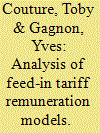

|
|
|
|
|
| Publication |
2010.
|
| Summary/Abstract |
Recent experience from around the world suggests that feed-in tariffs (FITs) are the most effective policy to encourage the rapid and sustained deployment of renewable energy. There are several different ways to structure a FIT policy, each with its own strengths and weaknesses. This paper presents an overview of seven different ways to structure the remuneration of a FIT policy, divided into two broad categories: those in which remuneration is dependent on the electricity price, and those that remain independent from it. This paper examines the advantages and disadvantages of these different FIT models, and concludes with an analysis of these design options, with a focus on their
|
|
|
|
|
|
|
|
|
|
|
|
|
|
|
|
| 3 |
ID:
109336
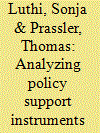

|
|
|
|
|
| Publication |
2011.
|
| Summary/Abstract |
A transition to a renewable energy system is high on the policy agenda in many countries. A promising energy source for a low-carbon energy future is wind. Policy-makers can attract wind energy development by providing attractive policy frameworks. This paper argues that apart from the level of financial support, both the risks stemming from the regulatory environment (legal security, administrative process and grid access) and the ability to finance projects play a critical role in determining the attractiveness of the development environment. It sheds light on how project developers trade off these different aspects and to what extent the attractiveness of a certain policy framework increases with the introduction of specific measures. Conjoint analysis is employed to provide empirical evidence on the preference of wind energy developers in the EU and the US. The analysis shows that developers' preferences are very similar across the studied regions and for different types of developers. Which policy measures could be most valuable depends on the specific existing environment. In some southeastern European countries, a reduction of administrative process duration may yield the highest utility gains, whereas, in the US, improvements in grid access regulation and an increase in remuneration levels may be more effective.
|
|
|
|
|
|
|
|
|
|
|
|
|
|
|
|
| 4 |
ID:
097440


|
|
|
|
|
| Publication |
2010.
|
| Summary/Abstract |
In recent years, the Taiwanese government has vigorously promoted the development of renewable energy to engage the challenges of gradual depletion of fossil fuels and oil, as well as the intensification of the greenhouse effect. Since the Sustainable Energy Policy Principles were announced in 2008, Taiwanese government has declared that the development of renewable energy should take into account goals that pertain to energy, the environment, and the economy (3E goals). This study aims to assess the 3E goals and renewable energy sources regulated by the Renewable Energy Development Bill that passed in 2009. The fuzzy analytic hierarchy process (FAHP) is used to resolve the multi-goal problem for achieving our research purposes. That is, this research attempts to reveal the suitable renewable energy sources for the purposes of meeting the 3E policy goals. The results first show that environmental goal is the most important to the development of various renewable energy technologies in Taiwan, followed by the economic and energy goals. Additionally, hydropower, solar energy, and wind energy would be the renewable energy sources utilized in meeting the 3E policy goals.
|
|
|
|
|
|
|
|
|
|
|
|
|
|
|
|
| 5 |
ID:
097482


|
|
|
|
|
| Publication |
2010.
|
| Summary/Abstract |
In recent years, the Taiwanese government has vigorously promoted the development of renewable energy to engage the challenges of gradual depletion of fossil fuels and oil, as well as the intensification of the greenhouse effect. Since the Sustainable Energy Policy Principles were announced in 2008, Taiwanese government has declared that the development of renewable energy should take into account goals that pertain to energy, the environment, and the economy (3E goals). This study aims to assess the 3E goals and renewable energy sources regulated by the Renewable Energy Development Bill that passed in 2009. The fuzzy analytic hierarchy process (FAHP) is used to resolve the multi-goal problem for achieving our research purposes. That is, this research attempts to reveal the suitable renewable energy sources for the purposes of meeting the 3E policy goals. The results first show that environmental goal is the most important to the development of various renewable energy technologies in Taiwan, followed by the economic and energy goals. Additionally, hydropower, solar energy, and wind energy would be the renewable energy sources utilized in meeting the 3E policy goals.
|
|
|
|
|
|
|
|
|
|
|
|
|
|
|
|
| 6 |
ID:
094880
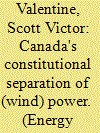

|
|
|
|
|
| Publication |
2010.
|
| Summary/Abstract |
This paper investigates the impact that a federal government structure has on strategic selection of renewable energy policy instruments. The context for this study centers on wind power development in Canada. Canada is a nation that is blessed by all the attributes necessary to catalyze global leadership in installed wind power capacity. Unfortunately, the constitutional separation of powers that underpins Canada's federal system impedes the creation of a national wind power development strategy because Canada's provinces have constitutional authority over electricity governance. The insights gleaned from the case study are used to develop a conceptual framework for understanding the impact that federal structure has on policy instrument selection and efficacy under areas of federal, regional and concurrent policy jurisdiction. Finally, this framework is re-applied to identify specific approaches the Canadian federal government could take to resolve what currently amounts to be a fragmented, ineffective approach to wind power development planning.
|
|
|
|
|
|
|
|
|
|
|
|
|
|
|
|
| 7 |
ID:
119788


|
|
|
|
|
| Publication |
2013.
|
| Summary/Abstract |
This article investigates the causal relationship between public policies and exports of renewable energy technologies using panel data from 18 countries for the period 1991-2007. A number of panel unit root and cointegration tests are applied. Time series data on public policies and exports are integrated and cointegrated. The dynamic OLS results indicate that in the long run, a 1% increase in government R&D expenditures (RAD) increases exports (EX) by 0.819%. EX and RAD variables respond to deviations from the long-run equilibrium in the previous period. Additionally, the Blundell-Bond system generalized methods of moments (GMM) is employed to conduct a panel causality test in a vector error-correction mechanism (VECM) setting. Evidence of a bidirectional and short-run, and strong causal relationship between EX and the contribution of renewable energy to the total energy supply (CRES) is uncovered. CRES has a negative effect on EX, whereas EX has a positive effect on CRES. We suggest some policy implications based on the results of this study.
|
|
|
|
|
|
|
|
|
|
|
|
|
|
|
|
| 8 |
ID:
113420


|
|
|
|
|
| Publication |
2012.
|
| Summary/Abstract |
Offshore wind power is regarded as a crucial renewable energy technology to achieve the ambitious CO2 reduction targets of the EU. However, offshore wind power is not yet competitive with traditional electricity generation technologies, so its sustained development depends on national support policies.
Employing a DCF model, this paper scrutinizes how national regulations and geographic conditions of designated national offshore wind development areas affect profitability. The focus of the analysis is on a set of hypothetical offshore wind park scenarios from five countries (Belgium, Denmark, Germany, France, and the UK). The inclusion of geographic conditions is significant, since water depth and distance to shore influence costs and because available wind resources determine the amount of electricity produced.
The paper's findings are threefold: Firstly, profitability results indicate that currently relevant scenarios in the UK and Germany are most attractive, but that the upcoming UK Round III projects have low attractiveness. Belgium, France, and Denmark follow in the rankings successively. Secondly, there is high variation among scenarios with respect to capital costs-differences amount up to +61%. Lastly, a future scenario assuming technology improvements and learning effects suggests that remuneration levels could be lowered by ~25% by 2020.
|
|
|
|
|
|
|
|
|
|
|
|
|
|
|
|
| 9 |
ID:
125387


|
|
|
|
|
| Publication |
2013.
|
| Summary/Abstract |
Renewable energy sources of heat offer the substantial economic, environmental and social benefits associated with renewable electricity but policy to support their expansion is considerably less advanced. The potential for applying various support instruments to renewable heat is considered with advantages and disadvantages discussed.
|
|
|
|
|
|
|
|
|
|
|
|
|
|
|
|
| 10 |
ID:
115654


|
|
|
|
|
| Publication |
2012.
|
| Summary/Abstract |
Various public policies in the United States are providing financial incentives for installation and generation of electricity from renewable resources. This article examines the influence of investment subsidies, greenhouse gas (GHG) prices, and renewable energy credit (REC) prices on the economic performance of grid-connected photovoltaic (PV) systems. Our model integrates PV output, capacity-factor-based dispatch, and cost-benefit financial components to evaluate new PV installations in California and Texas. Relative to the base case, the benefit-cost ratio increases between 5-53% in California and 5-38% in Texas for the policy-derived cases of GHG and REC prices. The economic performance of PV is higher in California due to higher grid electricity prices and the profile of displaced marginal fuels. A sensitivity analysis demonstrates the electricity and GHG prices required to achieve profitability. A key element of the economic analysis demonstrates the importance of assessing the marginal fuels displaced by the PV system, not the average mix of displaced fuels, in terms of accurately monetizing the GHG abatement embodied in the displaced fuels. In California, for example, the discounted benefits derived from pollution abatement under the marginal displacement approach were 1.6-3.0 times higher than under the three average fuel mix cases.
|
|
|
|
|
|
|
|
|
|
|
|
|
|
|
|
| 11 |
ID:
166362
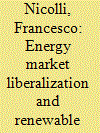

|
|
|
|
|
| Summary/Abstract |
This paper investigates the effect of energy liberalization, compared to other drivers, on policies that support renewable energy in a long panel of OECD countries. We estimate this effect by accounting for the endogeneity of liberalization related to joint decisions within a country’s energy strategy. Using regulation in other industries as instruments, we find that energy liberalization increases public support for renewable energy. The effect of liberalization is the second largest after the effect of per-capita income and is mostly driven by reductions in entry barriers, while the effect of privatization is unclear. This finding suggests that a reduction in the monopolistic power of state-owned utilities has a positive effect on renewable energy policies when various types of actors are ensured access to the grid instead of it being provided to only a few large private firms.
|
|
|
|
|
|
|
|
|
|
|
|
|
|
|
|
| 12 |
ID:
186452
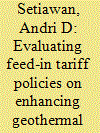

|
|
|
|
|
| Summary/Abstract |
Geothermal is vital for sustainably meeting Indonesia's energy demand, given its estimated massive reserves potential equivalent to 24 GW of electricity. The Indonesian government has set geothermal contributions to the national energy mix at 7,241.5 MW by 2025 and 17,546 MW by 2050, despite harnessing such vast potential needing significant investment. To that goal, the government established a feed-in tariff (FIT) mechanism to encourage private sector investment in geothermal development. However, FIT has undergone significant alterations in a short period. Moreover, various complicating factors—bureaucracy, social, and technical—exist alongside FIT implementation. Therefore, the extent that FIT can effectively enhance geothermal development in Indonesia should be challenged with further investigation. This study explores the efficacy of FIT policies for geothermal electricity by comparing the performance of several FIT schemes in terms of their impact on the government's target achievement. This study combines the policy analysis framework with system dynamics modeling to understand the dynamic interaction of FIT policy and other important components in geothermal development. The findings show that modest bureaucracy and public support are required. Furthermore, to enhance geothermal development more effectively, FIT should be at least 11 cents US$/kWh and accompanied by technical breakthroughs and government-funded exploration activities.
|
|
|
|
|
|
|
|
|
|
|
|
|
|
|
|
| 13 |
ID:
133013


|
|
|
|
|
| Publication |
2014.
|
| Summary/Abstract |
Many advanced industrialized countries have, in recent years, experienced a significant expansion of electricity production from renewables. Yet we know quite little about the dynamics of the underlying policychoices in this area. Using new data on adoptions and changes in feed-in tariff and green certificate schemes in 26 advanced industrialized countries over 20 years, we examine both domestic driving forces as well as international determinants. The findings suggest that three factors play a particularly important role in pushing countries towards market-based support systems: characteristics of the existing energy supply system, a federalist structure of the political system, and EU membership. Particularly noteworthy is the finding that higher shares of fossil and nuclear energy in the national energy supply as well as higher CO2intensity of the economy do not, as we had expected, stand in the way of policies for supporting renewables in electricity production. To the contrary, they increase the likelihood of a country adopting such policies. We also find, however, that higher economic growth and higher growth in solar and wind energy capacity tend to reduce the political appetite for reforms of existing schemes.
|
|
|
|
|
|
|
|
|
|
|
|
|
|
|
|
| 14 |
ID:
167041
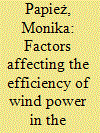

|
|
|
|
|
| Summary/Abstract |
The study uses the two-stage bias-corrected DEA approach of Simar and Wilson (2007) to assess the efficiency of the EU countries in terms of their wind power investment in 2015. The set of input variables includes installed wind power capacity and average wind power density, while output variables include wind-generated electricity and three additional aspects: environmental, economic and energy security. Next, the study examines the effect of renewable energy policy regarding wind energy, the energy mix, and the offshore wind power utilisation on the wind power efficiency of the analysed countries.
|
|
|
|
|
|
|
|
|
|
|
|
|
|
|
|
| 15 |
ID:
134311
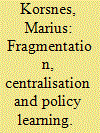

|
|
|
|
|
| Summary/Abstract |
This paper seeks to understand what government mechanisms have allowed China’s wind industry to grow as fast as it has over the past ten years. Instead of formal rules and regulations, this paper focuses on specific sets of institutional conditions that have been crucial in the process of high-speed implementation of wind energy in China. Specifically, fragmentation and centralisation, together with policy experimentation and policy learning, have been fundamental for policy flexibility and institutional adaptability. The paper illustrates that there are benefits and disadvantages to these characteristics, and that inherent qualities of China’s governing system that lead to rapid growth overlap with those that lead to challenges in terms of quality and long-term performance.
|
|
|
|
|
|
|
|
|
|
|
|
|
|
|
|
| 16 |
ID:
132696


|
|
|
|
|
| Publication |
2014.
|
| Summary/Abstract |
Offshore wind technology has recently undergone rapid deployment in the UK. And yet, up until recently, the UK was considered a laggard in terms of deploying renewable energy. How can this burst of offshore wind activity be explained? An economic analysis would seek signs for newfound competitiveness for offshore wind in energy markets. A policy analysis would highlight renewable energy policy developments and assess their contribution to economic prospects of offshore wind. However, neither perspective sheds sufficient light on the advocacy of the actors involved in the development and deployment of the technology. Without an account of technology politics it is hard to explain continuing policy support despite rising costs. By analysing the actor networks and narratives underpinning policy support for offshore wind, we explain how a fairly effective protective space was constructed through the enroling of key political and economic interests.
|
|
|
|
|
|
|
|
|
|
|
|
|
|
|
|
| 17 |
ID:
175911
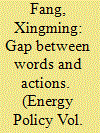

|
|
|
|
|
| Summary/Abstract |
With the increasing concern about energy sustainable policies, the words (willingness) and actions (behavior) of residents to support the renewable energy development have attracted lots of attention. However, most current studies focused on the willingness or behavior separately, ignoring the consistency between them. Given the wide gap between consumers' actual behavior and their willingness to support renewable energy found by a national energy survey in 2016, this paper aims to empirically explore the factors influencing the consistency between the willingness and behavior of Chinese residents through a bivariate-probit model. The empirical results indicate that socio-economic factors, socio-demographic factors and subjective factors have significant influences on residents’ consistency to support renewable energy development. Among them, subjective factors play the most important role. When the full sample is divided into a rural group and an urban group, it shows that income, education and energy supply satisfaction have more impacts on rural residents, while environmental concern and carbon emission knowledge affect urban residents by a larger magnitude. This paper provides important policy implications on how to guide residents willing to support renewable energy to take real actions in their life.
|
|
|
|
|
|
|
|
|
|
|
|
|
|
|
|
| 18 |
ID:
111058


|
|
|
|
|
| Publication |
2012.
|
| Summary/Abstract |
Investments in renewable energy (RE) technologies are regarded with increasing interest as an effective means to stimulate growth and accelerate the recovery from the recent financial crisis. Yet, despite their appeal, and the numerous policies implemented to promote these technologies, the diffusion of RE projects remains somehow below expectations. This limited penetration is also due to a lack of appropriate financing and to a certain reluctance to invest in these technologies. In order to shed light on this phenomenon, in this paper we examine the decision making process underlying investments in RE technologies. We propose and test a conceptual model that examines the structural and behavioural factors affecting the investors decisions as well as the relationship between RE investments and portfolio performance. Applying econometric techniques on primary data collected from a sample of European investors, we study how the investors' a-priori beliefs, their preferences over policy instruments and their attitude toward technological risk affect the likelihood of investing in RE projects. We also demonstrate that portfolio performance increases with an increase of the RE share in the portfolio. Implications for scholars, investors, technology managers and policy makers are derived and discussed.
|
|
|
|
|
|
|
|
|
|
|
|
|
|
|
|
| 19 |
ID:
166995
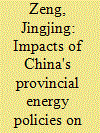

|
|
|
|
|
| Summary/Abstract |
The production and consumption of energy is the predominant source of air pollution worldwide. Thus, governmental energy control policies may lead to large reductions in air pollutant emissions. Energy policies can be broadly categorized into two types based on their policy goals. First are emission reduction policies, identified as throttling measures, which aim to reduce emissions from the source; second are renewable energy policies, which are dedicated to the development and promotion of renewable energy. This paper employs a spatial econometric method to empirically test the effects of these two types of energy policies on China's emissions of major air pollutants, namely PM10, PM2.5, and SO2, using panel data from 27 provinces and four direct-controlled municipalities over the period from 2003 to 2016. The results offer evidence that provincial emission reduction policies have positive impacts on reduction of PM10, whereas provincial renewable energy policies have positive impacts on the reduction of SO2 and PM2.5. The results also show that energy policies in one province can influence emissions of pollutants in neighbouring provinces due to policy spillover effects. Several policy implications are made based on the research findings.
|
|
|
|
|
|
|
|
|
|
|
|
|
|
|
|
| 20 |
ID:
128398


|
|
|
|
|
| Publication |
2014.
|
| Summary/Abstract |
Understanding how household practices with regard to energy usage change and how to most effectively encourage the adoption of technologies that utilize renewable energy sources at the residential scale are important issues for addressing the environmental impacts of energy use. Here, the social practices model (Spaargaren, 2003) is applied to examine solar technology adopters in two U.S. States who were interviewed about adopting residential solar electric technology and specifically about their experiences with the rebate and incentive programs available to them. Examining the policies and interrogating their potentially unintended consequences from the perspective of the user sheds light on how residential solar incentive programs act as systems of provision, shaping the practices of solar technology adopters, in hopes of improving these incentive programs and effectively encouraging increased residential solar technology adoption. Findings suggest that feed-in tariffs offer additional positive outcomes related to broadening the context for adoption and encouraging future energy conservation while size restrictions, wholesale pricing in net metering agreements, and inconsistent policy mechanisms across utilities in the same state all have potentially unintended negative consequences. Utilizing a perspective attentive to social practice offers a means of improving the design and implementation of energy policy.
|
|
|
|
|
|
|
|
|
|
|
|
|
|
|
|
|
|
|
|
|